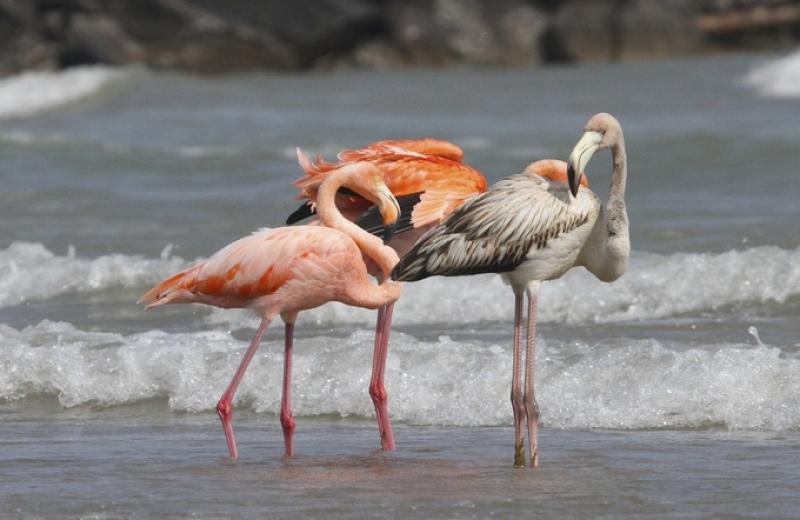Flamingos In Wisconsin? Tropical Birds Visit Lake Michigan Beach In A First For The Northern State
Flamingos In Wisconsin? Tropical Birds Visit Lake Michigan Beach In A First For The Northern State

Paul A. Smith, ASSOCIATED PRESS Flamingos stand by the water along a Lake Michigan beach on Friday, Sept. 22, 2023 in Port Washington, Wis. The American flamingos spotted Friday at the beach, about 25 miles (40 kilometers) north of Milwaukee, marked the first sighting of the species in Wisconsin state history, said Mark Korducki, a member of the Wisconsin Society for Ornithology. (Paul A. Smith /Milwaukee Journal-Sentinel via AP)
PORT WASHINGTON, Wis. (AP) — Five flamingos that showed up in Wisconsin to wade along a Lake Michigan beach attracted a big crowd of onlookers eager to see the unusual visitors venturing far from their usual tropical setting.
The American flamingos spotted Friday in Port Washington, about 25 miles (40 kilometers) north of Milwaukee, marked the first sighting of the species in Wisconsin state history, said Mark Korducki, a member of the Wisconsin Society for Ornithology, the Milwaukee Journal Sentinel reported.
The birds stood quietly 25 feet (7.6 meters) off Lake Michigan’s western shoreline as waves lapped against their thin legs. Three were adults, identifiable by their pink plumage, and two were juveniles clad in gray.
Jim Edelhuber of Waukesha was among a crowd of about 75 bird enthusiasts drawn to the city's South Beach after word spread on social media about the flamingos' appearance there.
“This is huge. This is unbelievable," said Edelhuber, an avid bird watcher and photographer.
The sighting was unexpected but not a total shock because of recent reports of flamingos in Indiana, Kentucky, Ohio and Pennsylvania, said Ryan Brady, conservation biologist with the Wisconsin Department of Natural Resources.
Wildlife biologists hypothesized that the flamingos were pushed north in late August by the strong winds of Hurricane Idalia, the Journal Sentinel reported.
The typical range of the American flamingo is Florida and other Gulf Coast states as well as the Caribbean and northern South America.
Debbie Gasper of Port Washington made the short trip to the lakefront with her husband, Mark. She said that before Friday the only flamingos she has seen have been on the couple’s trips to Aruba.
Gasper said she was going to send photos of the birds to relatives in Georgia who “aren’t going to believe it.”

.

.

The administrator of this group reserves the right, along with the site moderators, to moderate all and any postings to this group, including the right to enforce the ToS, the CoC, and also including anything that the administrator deems within his sole discretion to be offensive, including but not limited to political and/or off topic comments, with the power to delete in exercising that right.
It would be best, therefore, to be civil in posting on this group and not contravene the CoC, the ToS, and to not post comments that are political, insulting, taunting, trollling or offensive.
By now it should be well known that I am unable to open certain sources, videos and pictures. If I cannot, I will ask that they be described and explained. If the poster refuses to comply, their comment will be deleted. Instagrams are banned.




Although I read that experts say that the hurricanes are the cause, I think that the Global Warming is extending the usual boundaries for wildlife.
Likely a bit of both.
There are many insects, plants and animals migrating North due to anthropogenic global warming/climate change.
Warming oceans also create more and stronger storms.
Thank you for posting a sane common sense comment.
Until the birds can talk we'll never know why they ended up in numerous places where dont usually appear, but I think the hurricane explanation sounded quite plausible.
I do think it is cool for the residents of the Great Lakes to be able to see these birds live. Not sure how much fun it is for the flamingoes.
If the flamingoes weren't comfortable and happy to be there they wouldn't go there - nobody is forcing them.
I saw a story about this on TV the other night. The scientists interviewed said it was because of the hurricane, and that the flamingos will be leaving soon.
Thanks fo the update.